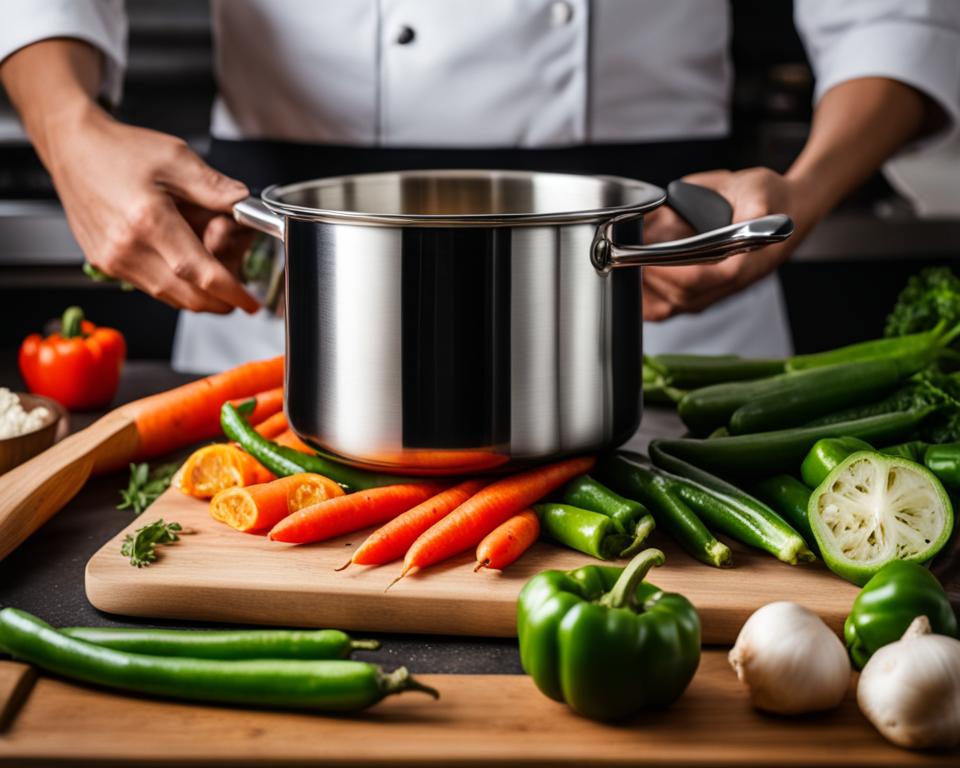What is the best oil for stainless steel cooking?
There are many different oils that can be used for stainless steel cooking, but not all oils are created equal. Some oils are better suited for stainless steel cooking than others, depending on factors such as smoke point, flavor, and cost.
The best oil for stainless steel cooking is one that has a high smoke point, is flavor neutral, and is relatively affordable. Some good options include canola oil, avocado oil, grapeseed oil, and safflower oil.
When choosing an oil for stainless steel cooking, it is important to consider the following factors:
- Smoke point: The smoke point of an oil is the temperature at which it begins to smoke and break down. Oils with a high smoke point are better suited for high-heat cooking, while oils with a low smoke point are better suited for low-heat cooking.
- Flavor: The flavor of an oil can be affected by its smoke point, as well as its source and processing method. Some oils have a strong flavor, while others are more neutral in flavor.
- Cost: The cost of an oil is another factor to consider, as some oils are more expensive than others.
Once you have considered these factors, you can choose the best oil for stainless steel cooking for your needs.
Here is a table comparing some of the most popular oils for stainless steel cooking:
| Oil | Smoke point (°F) | Flavor | Cost |
|---|---|---|---|
| Canola oil | 400°F | Neutral | Affordable |
| Avocado oil | 520°F | Nutty | More expensive |
| Grapeseed oil | 420°F | Light and buttery | Affordable |
| Safflower oil | 450°F | Light and nutty | Affordable |
Ultimately, the best oil for stainless steel cooking is the one that you prefer and that works well for your cooking style.
Benefits of using oil for stainless steel cooking
There are many benefits to using oil for stainless steel cooking, including:
- Oil helps to prevent food from sticking to the pan.
- Oil adds flavor to food.
- Oil can help to create a browning effect on food.
- Oil can help to keep food moist.
Overall, using oil for stainless steel cooking can help to create dishes that are more flavorful, more evenly cooked, and more visually appealing.
Benefits of using oil for stainless steel cooking
There are a number of benefits to using oil for stainless steel cooking, including:
- Oil helps to prevent food from sticking to the pan.
- Oil can help to create a more flavorful crust on food.
- Oil can help to keep food moist and juicy.
- Oil can help to prevent the formation of harmful chemicals when cooking at high temperatures.
Overall, using oil for stainless steel cooking can help to create healthier, more flavorful, and more satisfying meals.
Different types of oil for stainless steel cooking
There are many different types of oil that can be used for stainless steel cooking, each with its own unique set of properties. Some of the most popular oils for stainless steel cooking include:
* **Olive oil:** Olive oil is a good choice for stainless steel cooking because it has a high smoke point and a neutral flavor. It is also a good source of antioxidants, which can help to protect your cookware from damage.
* **Canola oil:** Canola oil is another good option for stainless steel cooking. It has a high smoke point and a mild flavor. Canola oil is also a good source of omega-3 fatty acids, which are beneficial for heart health.
* **Avocado oil:** Avocado oil is a good choice for stainless steel cooking because it has a high smoke point and a buttery flavor. Avocado oil is also a good source of monounsaturated fats, which can help to lower cholesterol levels.
* **Grapeseed oil:** Grapeseed oil is a good choice for stainless steel cooking because it has a high smoke point and a light flavor. Grapeseed oil is also a good source of vitamin E, which is an antioxidant.
* **Coconut oil:** Coconut oil is a good choice for stainless steel cooking because it has a high smoke point and a slightly sweet flavor. Coconut oil is also a good source of medium-chain triglycerides, which can help to boost metabolism and promote weight loss.
The best oil for stainless steel cooking will vary depending on your individual needs and preferences. Consider the smoke point, flavor, and nutritional value of each oil before making a decision.
How to use oil for stainless steel cooking
To use oil for stainless steel cooking, follow these steps:
1. **Heat the pan over medium heat.** The pan should be hot enough to cause the oil to shimmer but not smoke.
2. **Add a small amount of oil to the pan.** You only need enough oil to coat the bottom of the pan.
3. **Swirl the pan to coat the bottom evenly with oil.**
4. **Add your food to the pan.** The food should sizzle when it hits the oil.
5. **Cook the food according to your recipe.**
Be sure to use a high-quality oil that is suitable for high heat cooking. Some good options include avocado oil, canola oil, grapeseed oil, and safflower oil. Avoid using olive oil for stainless steel cooking, as it has a low smoke point and can break down when heated to high temperatures.
Here are some tips for using oil for stainless steel cooking:
* **Use a little oil.** You only need enough oil to coat the bottom of the pan. Too much oil can cause the food to become greasy.
* **Swirl the pan to coat the bottom evenly.** This will help to prevent the food from sticking to the pan.
* **Don’t overcrowd the pan.** Crowding the pan will prevent the food from cooking evenly.
* **Cook the food over medium heat.** High heat can cause the food to burn.
* **Don’t stir the food too much.** Stirring the food too much can release moisture, which can cause the food to become soggy.
By following these tips, you can use oil for stainless steel cooking without any problems.
VI. How to clean stainless steel cookware after using oil
After you have finished cooking with oil on your stainless steel cookware, it is important to clean it properly to prevent the oil from building up and causing the cookware to become sticky or difficult to clean. Here are a few tips for cleaning stainless steel cookware after using oil:
- Rinse the cookware with hot water and dish soap immediately after cooking.
- Use a soft sponge or brush to gently scrub the cookware.
- Avoid using harsh chemicals or abrasive cleaners, as these can damage the surface of the cookware.
- If there is any stubborn oil residue, you can soak the cookware in a solution of warm water and dish soap for a few minutes before scrubbing it.
- Once the cookware is clean, dry it thoroughly with a soft towel.
By following these tips, you can keep your stainless steel cookware clean and looking its best.
FAQs about using oil for stainless steel cooking
Q: What is the best oil for stainless steel cooking?
A: There is no one-size-fits-all answer to this question, as the best oil for stainless steel cooking will vary depending on the specific dish you are making. However, some general tips for choosing an oil for stainless steel cooking include:
- Use an oil with a high smoke point, such as avocado oil, grapeseed oil, or safflower oil. This will help to prevent the oil from smoking and burning, which can damage your cookware.
- Choose an oil that is flavor neutral or has a mild flavor, so that it does not overpower the taste of your food.
- Use a small amount of oil, just enough to coat the bottom of your pan. This will help to prevent food from sticking to the pan, but it will also help to keep your food from becoming greasy.
Q: Do I need to use oil when cooking on stainless steel?
A: You do not necessarily need to use oil when cooking on stainless steel, but it can help to prevent food from sticking to the pan. If you are cooking a delicate dish, such as fish or eggs, you may want to use a little bit of oil to help prevent the food from sticking. However, if you are cooking a more robust dish, such as a steak or a stir-fry, you may not need to use any oil at all.
Q: How do I clean stainless steel cookware after using oil?
A: To clean stainless steel cookware after using oil, simply wash it with warm, soapy water and a non-abrasive sponge. Be sure to rinse the cookware thoroughly and dry it immediately to prevent water spots from forming.
Q: What are some common mistakes people make when using oil for stainless steel cooking?
Some common mistakes people make when using oil for stainless steel cooking include:
- Using too much oil. This can lead to food becoming greasy and unhealthy.
- Using the wrong type of oil. Some oils, such as olive oil, have a low smoke point and can smoke and burn easily.
- Not cleaning the cookware properly after use. This can lead to food buildup and water spots.
By avoiding these common mistakes, you can help to ensure that your stainless steel cookware stays clean and looking its best.
Conclusion
VIII. Conclusion
In conclusion, there are many different oils that can be used for stainless steel cooking. The best oil for you will depend on your individual needs and preferences. Some factors to consider include the smoke point of the oil, its flavor, and its cost. Be sure to experiment with different oils until you find one that you like and that works well for your cooking style.
Thank you for reading!
Resources
Here are some resources that you may find helpful:
- The Spruce Eats: Best Oil for Stovetop Sear
- Bon Appétit: The Best Oil for Every Cooking Method
- Serious Eats: Cooking Oils 101: Which Oil to Use When
Call to action
If you’re looking for the best oil for stainless steel cooking, be sure to check out the resources above. With a little research, you’ll be able to find the perfect oil for your needs and enjoy delicious, healthy meals cooked on your stainless steel cookware.


